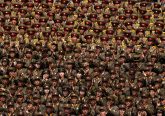North Korean Studies: the focus on the hermit kingdom, its politics, economics, and society; the kingdom that poses a real-life threat to South Korea, and the world order as we know it today; a unique Marxist-Leninist state in the twenty-first century.
Why focus on this particular area? More broadly, why devote time, funding, and research to the study of specific “areas” of the world? Surely an increasingly interconnected globe has rendered redundant the concept of a fixed “area”? The field of political geography—including geopolitics—has witnessed lengthy definitional and procedural debates around the field of area studies. North Korean studies—an area study in itself—offers a plethora of avenues for insight into area studies more widely in debates on how “best” to study the “darkest place on Earth”.
Area studies specialists are not uncommon in political geography. An interdisciplinary field dedicated to the study of geographical regions to expand understanding of the world as a whole, area studies has long been associated with the prominence of Sovietologists, scholars whose lives were devoted to study of the USSR. The end of the USSR saw the end of their careers. The subsequent rise of the European Union, and interest surrounding it, then led to a rise in “EU Studies” specialists. Comparisons between the USSR and North Korea are all too frequent, yet it is highly unlikely that a potential collapse of the hermit kingdom would lead to a similar collapse in North Korean studies. The temptation to identify as a specialist of a particular area is difficult for political geographers to resist; yet area studies has been vociferously criticised, particularly for its Western-centric perspective on viewing the wider world.
Can an Anglophone academic at a university in the West really analyse the intricacies of the mindset and culture of the North Korean citizen in the face of the Kim regime? Does a lack of language or cultural understanding of this unique kingdom render this analysis redundant? Questions like these justify the call for greater attention to be devoted to language, culture, and the relationship between the two, with respect to area studies. The association between North Korean studies and this language-culture nexus offers a potential pivot to ameliorating North Korean studies—resurrecting it from its demise and marginalisation—and area studies as a wider field.
AREAS
A prominent criticism of area studies has been the Western-centric lens through which specialists approach distant regions. For some scholars, such as Tessa Morris-Suzuki (2000), “area studies” should be reformulated into “anti-area studies”. Such calls emphasise the importance of approaching the study of particular areas from the people directly implicated in such studies, rather than an academic sitting comfortably in a Western university, at a distance from the “area” in question. Knowledge is parochial, as Jennifer Robinson (2003) attests: most knowledge in geopolitics emanates from the privileged position of the “West”. Analysing the 1997 East Asian economic crisis through a Western lens rather than the perspective of East Asian individuals themselves (a highly heterogeneous category), for example, reinforces such parochialism, in failing to address the issue “from below”.
In today’s hyper-globalised world, why should an area equate to a territorially fixed space? As Phillips (in Powell et al., 2016) writes, areas should be seen as fluid, as witnessed by the prevalence of transnational return migration: ongoing movement to and from host countries and countries of origin. This so-called serial area studies could, thus, serve a more useful purpose. In addition, the example of defectors from North Korea fleeing the atrocious crimes against humanity committed in the nation, as they search for a more prosperous life south of the 38th Parallel, or further afield, reinforces the clarion call to decouple areas from ‘hegemonic territorial divisions’ (Phillips, in Powell et al., 2016:9).
Suffixes aside, while identification with a particular area may have offered an aura of specialism in political geography, a disdain for area studies and ‘area studies specialists’ is emerging. Specialisations in North Korea, for example, have been sarcastically dismissed by an EU studies specialist as ‘attempts to save the world’, and those in the Middle East as ‘not very virtuous… living out a James Bond fantasy’. Why should it generate so much surprise that a Western researcher can study North Korea, 5000 miles away, and study it fully? Such dismissals are not uncommon, but they are highly unfair, and, quite frankly, ignorant.
Yet the wider question remains: what is the future of area studies? Surely in a post-Brexit UK, this EU studies specialist should have plenty of work to do, instead of unfairly trashing those focusing on North Korean or Middle Eastern Studies.
CULTURE-LANGUAGE NEXUS
The study of North Korea has become academically marginalised into an outlier position in the field of area studies (yet while many specialists, including Robert Litwak in his 2012 compendium, would perceive North Korea as an “outlier state”, this assertion is questionable). In deepening understanding of North Korean studies as an area study, the nexus between culture and language plays a vital role. Although Rodong Sinmun – the official newspaper of the Central Committee of the Korean Workers’ Party of the DPRK—may be translated into English, it must be emphasised that with no understanding of Korean—linguistically and culturally—words on a page—even in one’s native English—remain merely that.
The writing of Fyodor Tertitskiy, and responses by David Tizzard, and Peter Ward, on NK News, has catalysed debates regarding this language-culture nexus. Tertitskiy claims that a Korean janitor, cleaning after a conference on the DPRK, may be better positioned to comment on the intricacies of the DPRK than a “Westerner”. Whilst this is somewhat hyperbolic, the core of his argument bears fruit.
Language and culture offer a means of addressing area studies in a more Morris-Suzukian sense of anti-area studies: inverting the gaze from the West, to the non-Western “area” itself. This is not restricted to simply recognizing the perspectives of the other—in this case, the Koreans themselves—but adopts an approach that understands the wider context, framed by culture and language, of individuals in these areas. The ideological underpinnings of the North Korean citizen, are often reduced to mere speculation from an ivory tower perspective, yet the true –often ‘hidden’—meaning can only emerge as knowledge of (North) Korean culture, and language, accumulates.
Consider the importance of testimonials from North Koreans—victims of crimes against humanity in the DPRK, as well as defectors—in the global plight towards accountability for human rights abuses in the state. First-hand accounts take on a truly new and enriched meaning with improved cultural and linguistic awareness. As such, resultant questions regarding whether to analyse North Korea in terms of a “country”, a “region”—within the Korean Peninsula—or an “area” in terms of South-eastern Asia, can be posed.
North Korea—and the Korean Peninsula—is situated at the vanguard of the global stage: who can forget the provocations by the North in April 2013, the image of a CNN reporter fearfully stating that Seoul ‘could become the next Ground Zero?’ The recent defection to South Korea, of Deputy Ambassador to the UK, Tae Yong-ho, from the North Korean “embassy” in Acton, London has further raised the profile of this “hermit kingdom”. Did Ambassador Tae have a sudden change of heart, or, as seems increasingly likely, was his defection a long-term objective? Insight into culture and language will further generate information, and potential answers.
Will NK studies “specialists” “save the world”? Will Middle Eastern studies specialists sip martinis that are shaken, not stirred? Notwithstanding these qualms, the role of linguistic and cultural knowledge offers much from which the studies of areas can profit, and, more specifically, the overlooked field of North Korean studies. May the demise of North Korean studies only serve to be a claim, not a truth.
References:
Powell, R.C., Klinke, I., Jazeel, T., Daley, P., Kamata, N., Heffernan, M., Swain, A., McConnell, F., Barry. A. & Phillips, R. 2016 Interventions in the political geographies of ‘area’ Political Geography 1-9.
Litwak, R.S. 2012 Outlier States: American Strategies to Change, Contain, or
Engage Regimes Washington, DC: Woodrow Wilson Center Press.
Morris-Suzuki, T. 2000 Anti-area studies Communal/Plural 8 9-23.
Robinson, J. 2003 Postcolonialising Geography: Tactics and Pitfalls Singapore
Journal of Tropical Geography 24(3) 273-289.







